Why a Water Heater Gas Smell Demands Your Immediate Attention
A water heater gas smell can range from a minor maintenance issue to a life-threatening emergency. Here's what you need to know right away:
Immediate Actions for Gas Smells:
- Strong smell: Evacuate immediately, don't use electronics, call 911 or gas company
- Faint smell: Turn off gas supply, ventilate area, call professional
- Rotten egg smell in water only: Likely bacteria, not gas - test hot vs. cold water
- Hissing sounds: Potential gas leak - evacuate and call professionals
Natural gas companies add mercaptan (a sulfur compound) to give gas its distinctive "rotten egg" smell. This safety feature helps detect leaks, but it's crucial to understand that not every bad smell from your water heater means gas is leaking.
The most dangerous mistake homeowners make is ignoring a gas smell because it seems to fade away. As one former gas line surveyor explains: "Mercaptan, the odorant in natural gas, is extremely potent, with a single drop affecting a large area. But odor fade is a phenomenon where the nose adapts to smells, leading to a reduced ability to detect gas even when present."
Some smells come from bacteria in the water itself, while others indicate serious gas leaks. Knowing the difference could save your life and your home.
I'm Tony Lara, and through my years in the HVAC field, I've helped countless homeowners diagnose water heater gas smell issues safely and effectively. My experience has taught me that quick, proper identification of these odors is essential for protecting both your family and your property.
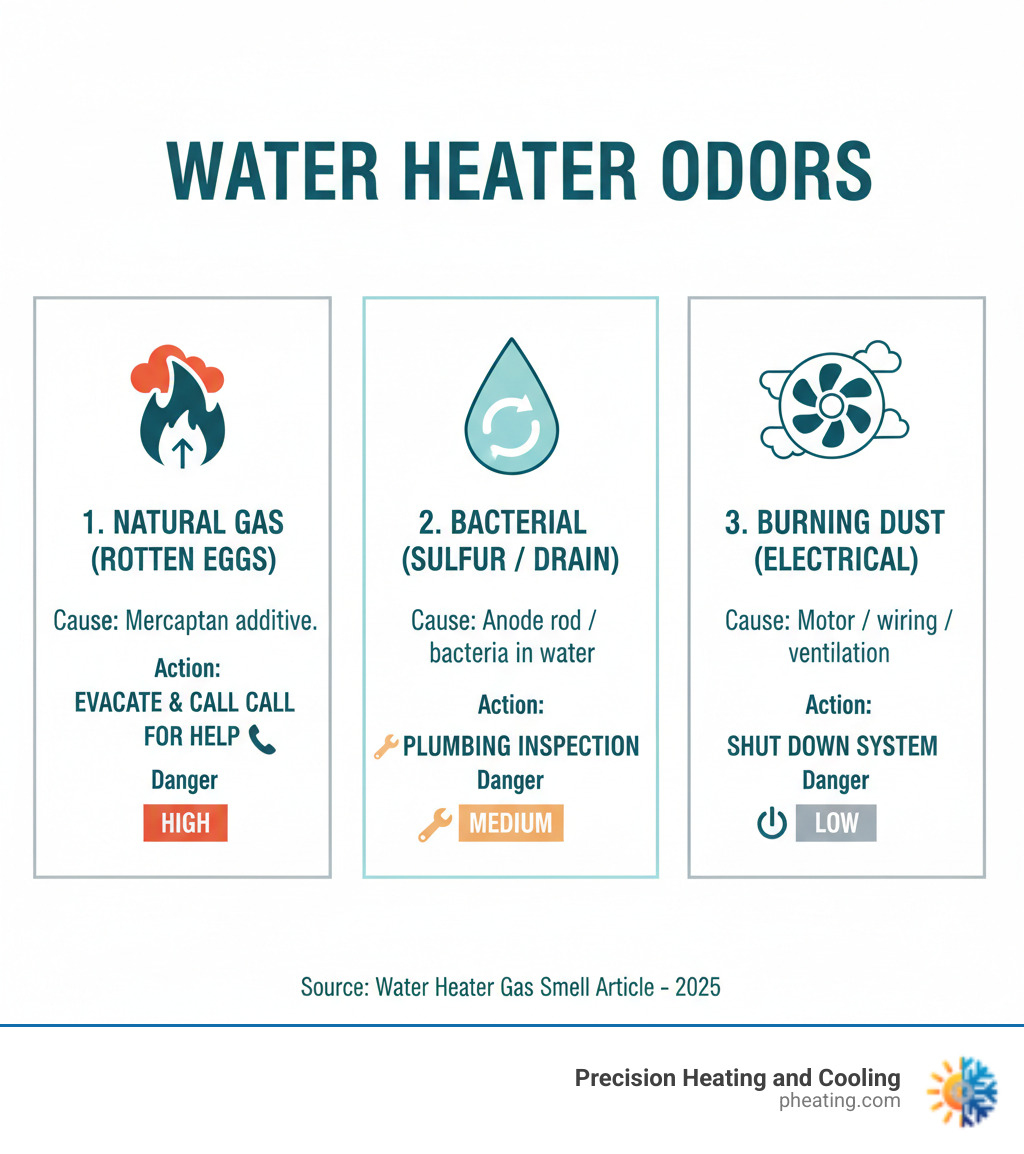
First Steps: What to Do Immediately If You Suspect a Gas Leak
If you detect a gas smell near your water heater, your immediate actions are critical. Natural gas is flammable and can pose a serious safety risk.
What to Do Immediately
- If the smell is strong: Evacuate everyone from the house immediately, including pets. Go to a safe distance (at least 350 feet away).
- If the smell is faint: You can take a moment to investigate cautiously. Check if it's coming from another appliance like a stove. If it's clearly from the water heater, proceed with the steps below.
Safety Precautions (For Any Gas Smell):
- No Sparks or Flames: Do not use anything that could create a spark. This includes light switches, phones, lighters, or any electrical appliances.
- Ventilate (If Safe): If the smell is faint and you can do so quickly, open doors and windows to air out the area. Do not do this if the smell is strong; evacuate immediately instead.
- Turn Off the Gas Supply (If You Know How and It's Safe): If you can safely access your main gas shut-off valve (often near the meter), turn it off. For the water heater specifically, the valve is usually on the gas pipe leading to the unit. A quarter turn is often all that's needed.
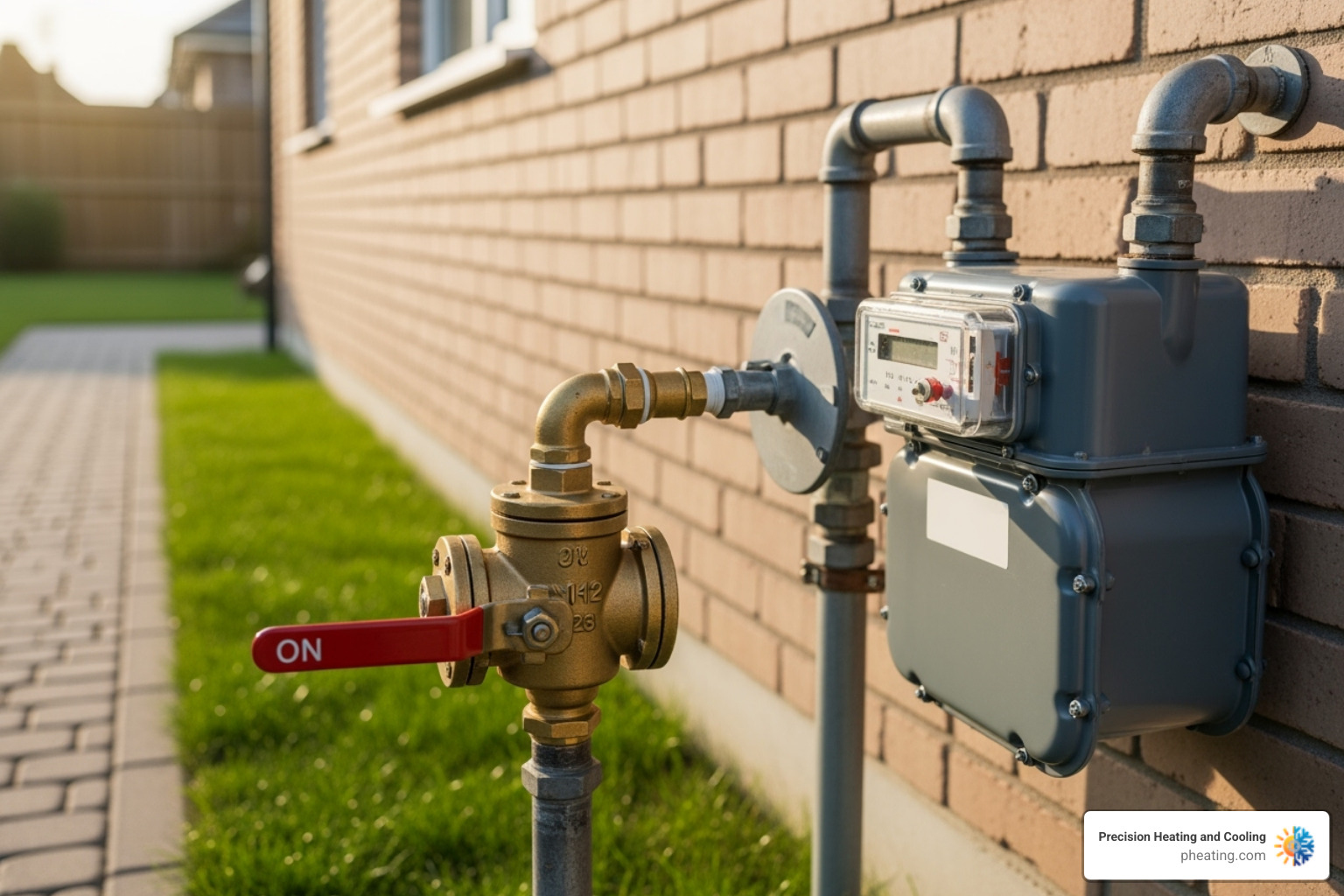
- Call for Help from a Safe Distance: Once you are safely outside, call your gas company's emergency line or 911. Report the suspected leak and follow their instructions. Do not re-enter your home until a professional has declared it safe.
- Be Aware of Health Symptoms: Gas leaks can cause dizziness, nausea, and headaches. If anyone feels unwell, inform emergency services.
Remember the phenomenon of "odor fade"—your nose can get used to the smell, making you think it's gone. Always treat any gas smell seriously, even if it seems to disappear. For more information about our water heater services, visit our dedicated page: [More info about our water heater services](https://pheating.com/water-heaters).
Decoding the Odors: Is It Really a Gas Smell?
When your water heater emits a strange odor, it's important to identify the source. Not every bad smell means a gas leak.
Natural gas is odorless, so utility companies add a chemical called mercaptan to give it a distinct "rotten egg" or sulfur smell for easy detection. If you smell this, it's a strong indicator of a gas leak from the unit or its supply line.
However, other smells can be misleading. Here’s a guide to help you differentiate:
| Odor Type | Likely Source | Recommended First Step |
|---|---|---|
| Rotten Eggs / Sulfur | Water: Bacteria in the tank. | Test if the smell is in both hot and cold water. If only hot, it's likely bacteria. |
| Gas / Mercaptan | Appliance: Gas leak from the unit or supply line. | Evacuate immediately and call for professional help. |
| Burning Dust / Plastic | Appliance: Dust on the burner or an electrical issue. | Turn off the power/gas to the unit and call a technician. |
| Sewer Gas | Plumbing: A dry P-trap in a nearby floor drain. | Pour water down the drain to refill the trap. |
The "Rotten Egg" Smell: Bacteria vs. Gas
If the rotten egg smell only comes from your hot water taps, it's likely caused by sulfate-reducing bacteria in your water heater tank. These harmless bacteria react with the anode rod, producing hydrogen sulfide gas. While not dangerous, it's unpleasant. Flushing the tank or replacing the anode rod can often solve this. For more details, you can check resources like this guide on smelly hot water.
The Hissing Sound: Another Telltale Sign
A hissing or whistling sound near your water heater often accompanies a gas leak. This is the sound of gas escaping under pressure from a loose fitting or a crack in the gas line. If you hear this, treat it as a serious leak: evacuate and call for help immediately.
Common Causes of a Water Heater Gas Smell and Other Alarming Noises
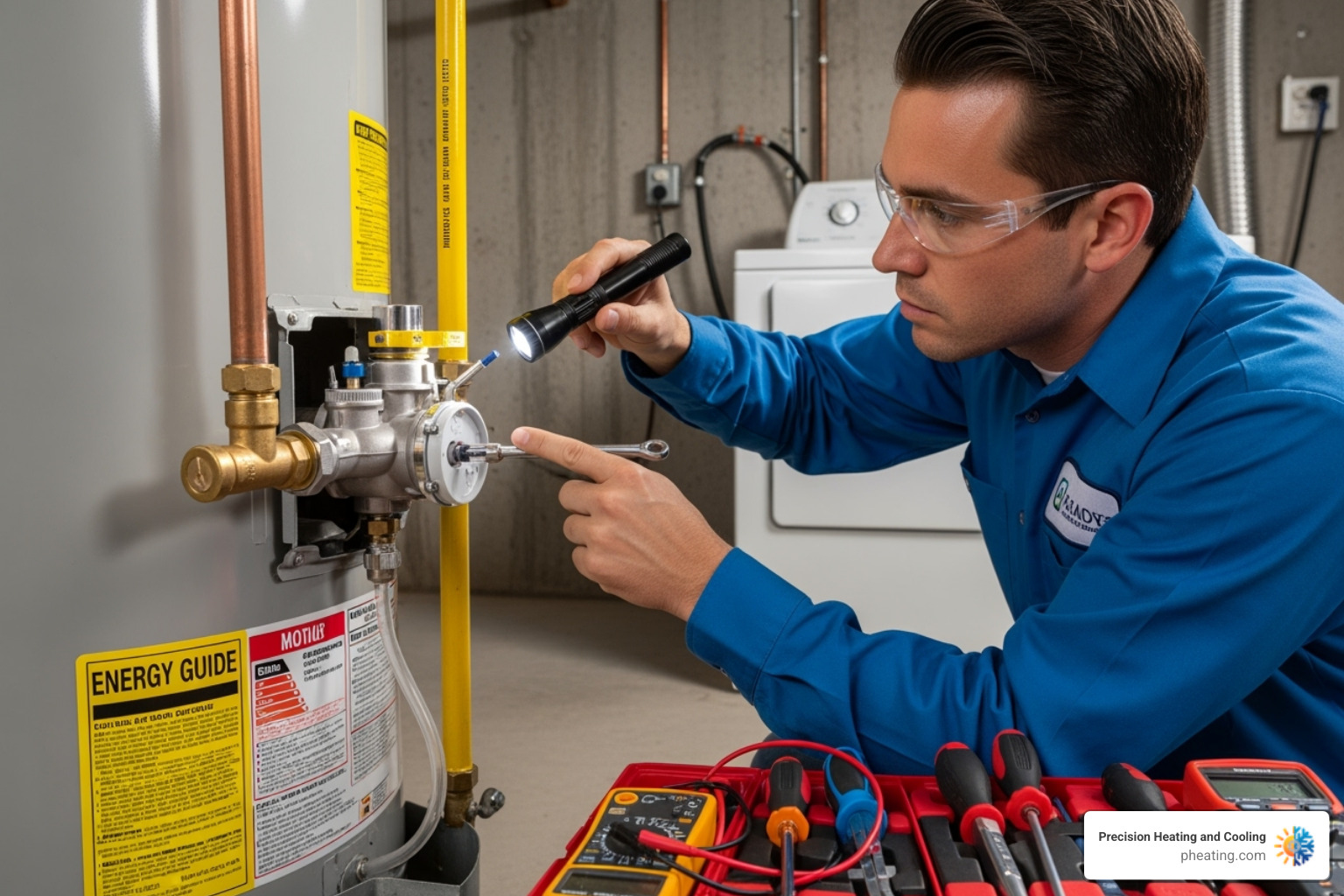
A water heater gas smell can stem from several issues, ranging from simple to severe. Understanding the potential causes can help you communicate more effectively with a professional.
- Gas Supply Line Leaks: The flexible line connecting your water heater to the gas supply can develop cracks or have loose fittings over time, allowing gas to escape.
- Faulty Gas Control Valve: This valve regulates gas flow. If it malfunctions, it can leak gas.
- Pilot Light or Igniter Issues: On older models, a pilot light that frequently goes out can release unburned gas. On newer models, a faulty electronic igniter can cause a similar issue.
- Improper Venting: A blocked or damaged vent pipe can trap exhaust gases, including carbon monoxide and unburned natural gas, inside your home. This is a serious hazard.
For a deeper dive into common water heater repair issues and solutions, we've put together a comprehensive guide: [Common Water Heater Repair Issues and Solutions](https://pheating.com/blog/common-water-heater-repair-issues-and-solutions).
Proactive Maintenance to Prevent Future Issues
Proactive maintenance is the best way to prevent a water heater gas smell and ensure your unit runs safely and efficiently.
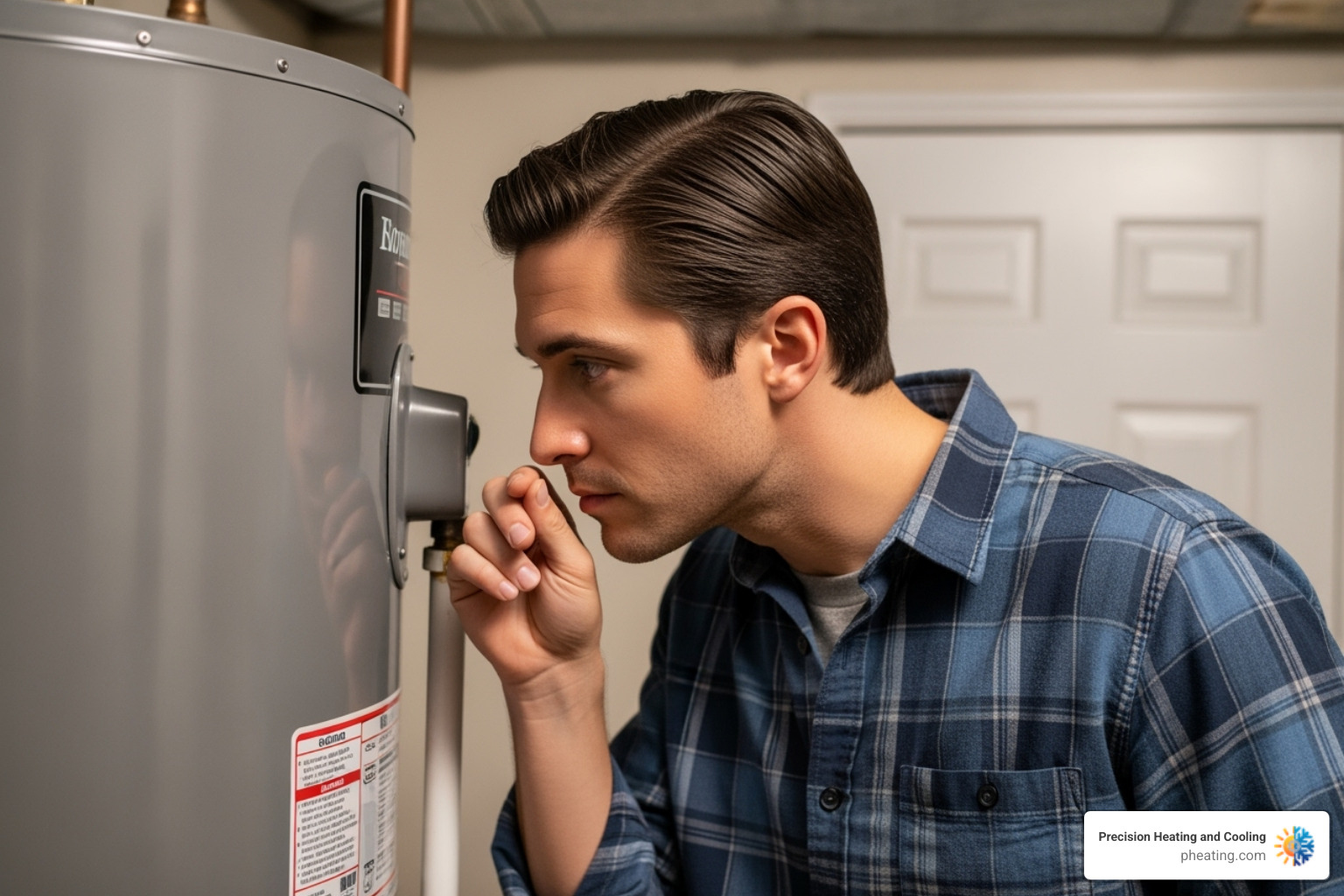
Here’s how to keep your water heater in top shape:
- Annual Professional Inspections: A qualified technician can inspect gas connections, the control valve, the pilot/igniter, and the venting system to catch potential issues early.
- Tank Flushing: Sediment buildup can cause odors and reduce efficiency. Flushing the tank annually removes this sediment. This involves turning off the power/gas, connecting a hose to the drain valve, and draining the tank. While some homeowners do this themselves, a professional can do it safely and thoroughly.
- Anode Rod Inspection: The anode rod protects your tank from rust but can contribute to a rotten egg smell as it corrodes. It should be inspected and replaced every few years.
- Keep the Area Clear: Never store flammable materials near your water heater. Ensure there's enough space around it for proper airflow and service access.
- Set the Right Temperature: Keeping the thermostat at or above 120°F (49°C) helps prevent the growth of odor-causing bacteria.
- Consider a Water Softener: If you have hard water, a softener can reduce mineral buildup in the tank.
Annual Water Heater Safety Checklist:
- Check for visible leaks.
- Test the temperature and pressure relief (T&P) valve.
- Inspect the anode rod.
- Flush the tank.
- Inspect the gas line and connections.
- Clean the pilot light or igniter assembly.
- Check the flue vent for blockages.
- Ensure proper ventilation.
- Listen for any unusual noises.
Following these steps can extend the life of your water heater and prevent dangerous situations. For expert guidance on water heater installation, see our Steps to a Successful Water Heater Installation.
Frequently Asked Questions about Water Heater Smells
We often get questions from homeowners about strange water heater odors. Here are some of the most common ones:
Can a brand new water heater have a gas smell?
Yes, a faint water heater gas smell can occur with a new unit. This is often due to manufacturing oils burning off, which should stop quickly. Some new gas valves also have a very slight, permissible gas release that is considered safe by industry standards. However, if any gas smell is strong or persists, it's crucial to have it professionally inspected immediately to rule out a leak.
What is "odor fade" and why is it dangerous?
Natural gas is scented with a chemical called mercaptan to make it detectable. "Odor fade" is when your nose gets used to this smell, making you think a leak has stopped when it hasn't. This is why you should never ignore a gas smell, even if it seems to go away. Always trust your first impression and call for help.
What's the difference between a natural gas and a propane (LP) gas leak?
The main difference is their density. Natural gas is lighter than air and will rise and dissipate. Propane (LP) gas is heavier than air and will sink, collecting in low-lying areas like basements. This makes propane leaks particularly dangerous as the gas can accumulate to explosive levels in enclosed spaces. Regardless of the gas type, any water heater gas smell requires immediate, cautious action.
When in Doubt, Call the Professionals
When it comes to a water heater gas smell, there’s no such thing as being "too careful." The potential dangers associated with gas leaks—ranging from health issues to fires and explosions—are simply too significant to risk. We always advise homeowners to prioritize safety above all else.
While we've provided extensive information to help you diagnose and understand these issues, there are critical moments when the best, and only, course of action is to call in the experts.
Why Professional Help is Non-Negotiable for Gas Issues:
- Safety First: Our technicians are trained and equipped to handle gas leaks safely. We have specialized tools, like gas sniffers, that can detect even minute gas concentrations that your nose might miss, especially due to odor fade. We know the proper protocols to ensure your home is safe before, during, and after a repair.
- Dangers of DIY Gas Repairs: Attempting to fix a gas leak yourself, without the proper training, tools, or experience, is incredibly dangerous. One wrong move can turn a minor leak into a catastrophic event. Gas systems are complex, involving precise pressure regulation, secure connections, and proper combustion.
- Importance of Professional Diagnosis: Not every smell indicates a gas leak, but only a professional can definitively determine the source and severity of the odor. We can distinguish between a true gas leak, bacterial issues, ventilation problems, or other mechanical failures. Our comprehensive approach ensures that the root cause is identified and properly addressed, not just the symptoms.
- Peace of Mind: Knowing that a certified and experienced professional has inspected and repaired your water heater provides invaluable peace of mind. You can rest easy knowing your family and home are safe.
At Precision Heating and Cooling, we bring over two decades of experience to every job, offering reliable service to homeowners across the San Jose Bay Area & Central Valley. Whether you're in San Jose, Cupertino, Los Gatos, Clovis, Palo Alto, Santa Clara, Sunnyvale, or Hanford, California, our team has the tools, training, and experience to protect your family’s comfort and safety. We're committed to competitive pricing and flexible payment options because we believe everyone deserves a safe and comfortable home.
Don't let a water heater gas smell keep you up at night. If you suspect a gas leak or have any concerns about your water heater's performance, please don't hesitate to reach out. We're here to help.
[Contact us for expert water heater repair in San Jose](https://pheating.com/water-heaters/water-heater-repair-san-jose-ca)

Flexible payment options to make your goals affordable and stress-free.

Keeping it Close: Local Heater Installation Services in Santa Clara

Heater Installation Without Breaking the Bank in Santa Clara













.avif)

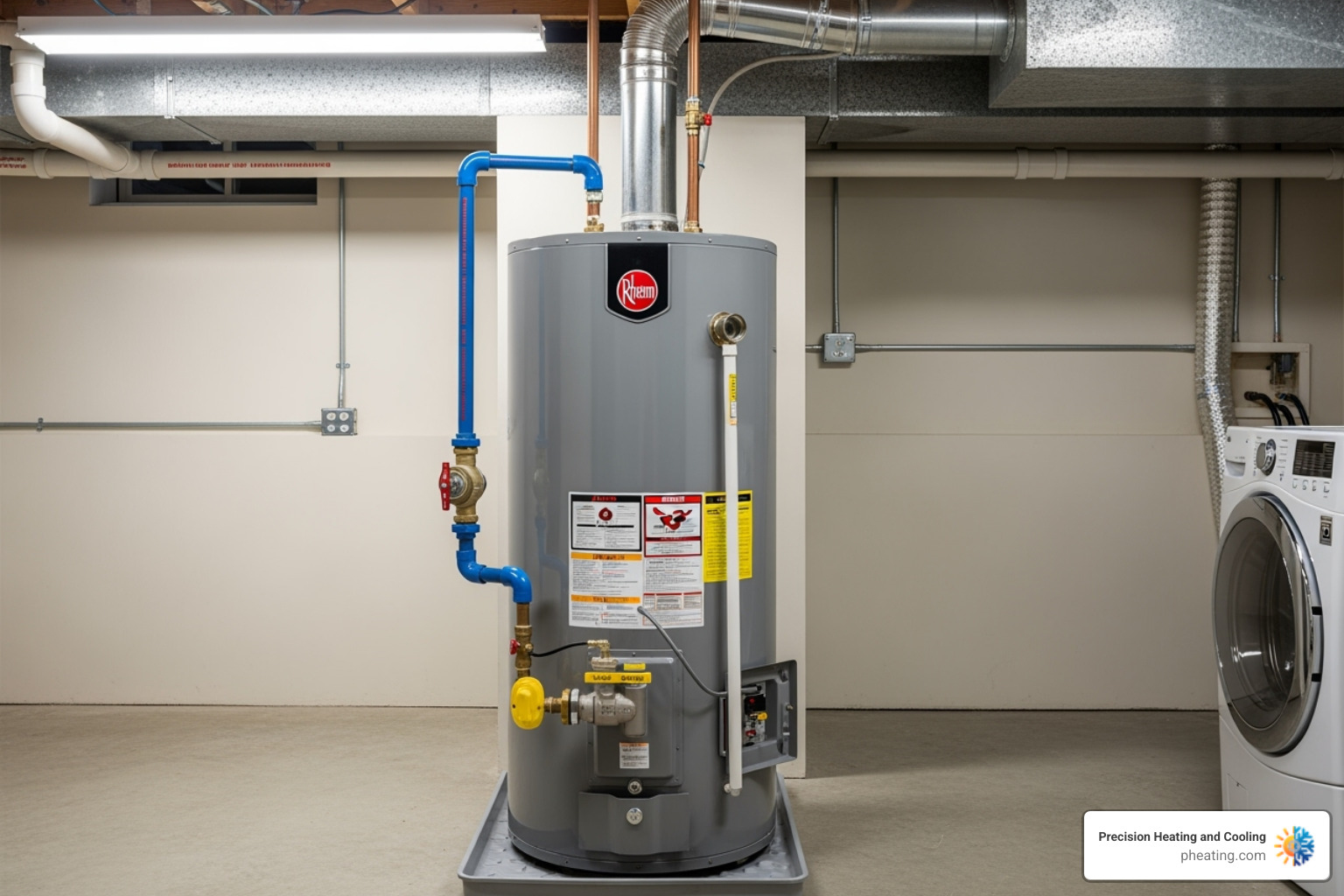








.avif)